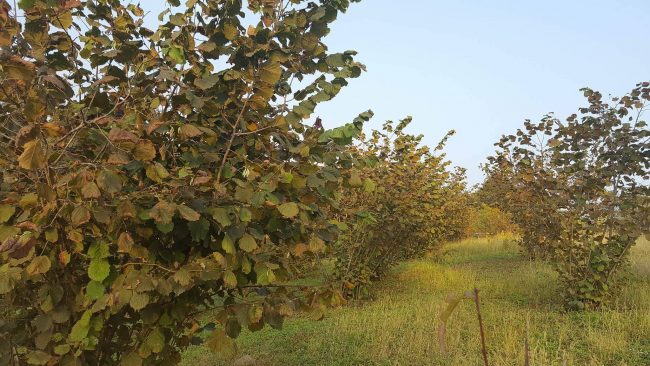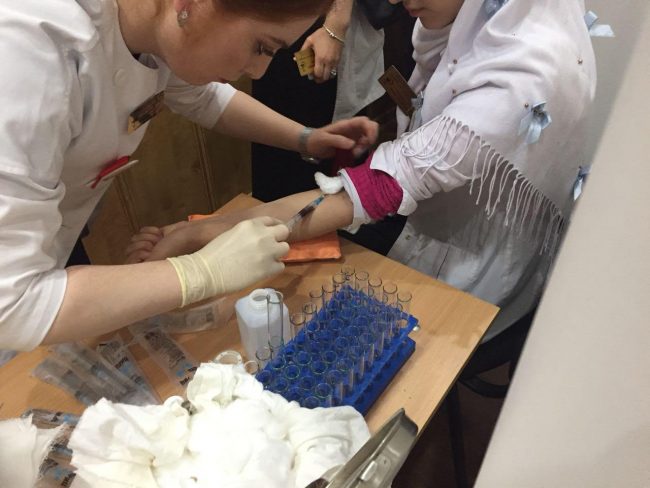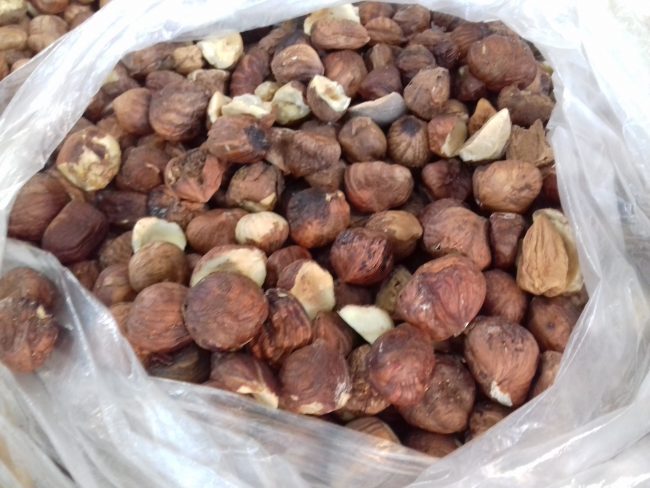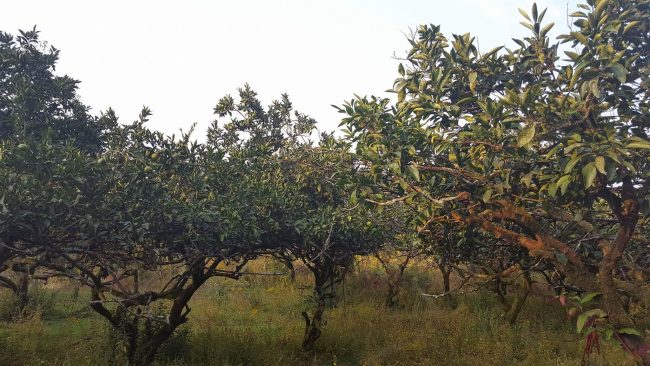

 An agricultural pest — the stink bug — has ravaged crops across western Georgia and Abkhazia this year. Aid was sent to Abkhazia by the government in Tbilisi, but people in Gali have seen no sign of these pesticides, which might possibly have saved their livelihoods.
An agricultural pest — the stink bug — has ravaged crops across western Georgia and Abkhazia this year. Aid was sent to Abkhazia by the government in Tbilisi, but people in Gali have seen no sign of these pesticides, which might possibly have saved their livelihoods.
[Read in Georgian — სტატია ქართულ ენაზე]
An agricultural pest
The presence of the brown marmorated stink bug was first recorded in western Georgia in 2015, but significant damage to hazelnut crops was not caused until 2016. The insect — an agricultural pest — has now spread throughout Samegrelo, Guria, Adjara, Imereti and in Abkhazia. It has also been spotted in Eastern Georgia, including in Tbilisi.
Nikoloz Meskhi, head of the Department of Plant Protection at the National Food Agency, told OC Media that last year, the bug caused an estimated at $50,000,000 of damage in Georgia. This year’s damage hasn’t yet been counted, but according to Meskhi, the problem is very serious. Each insect can consume more than 300 plants in it’s lifetime, can fly over long distances, and multiplies very quickly, laying up to 250 egg.
[Read: Stink bug devastates hazelnut crops in Samegrelo and Abkhazia]
Devastation in Gali


In eastern Abkhazia’s Gali District — populated almost exclusively by ethnic Georgians — so great is the devastation that many farmers have stopped harvesting their hazelnut crops entirely, after discovering that they have been spoiled.
People there told OC Media that in the villages of Lower Gali, almost no one managed to harvest any nuts at all, while in upper Gali, farmers expecting crops of two tonnes managed to salvage around 150–200 kilogrammes.
‘We harvested five–six tonnes of crops every year before this. Now we don’t even have a nut to make churchkhela, and we are left without vegetables and fruit either. My father used to say, “If I became hungry, I would sell my house and all my belongings for one loaf of bread”. I’m afraid, this time is coming’, one resident of the village of Chuburkhinji who asked to remain anonymous told OC Media. The main challenge for his family this year, he says, is to find ways to buy food and afford basic living conditions for his family.
Aid which never arrived

Aid was sent to people in Gali and other districts of Abkhazia in the form of free treatment of crops, just as was the case in western Georgia. Insecticides, and all the equipment needed to apply them, were sent.
The aid was taken from Tbilisi to Abkhazia by international humanitarian group Action Against Hunger, which has operated in Georgia since 1994 and has several offices in Abkhazia. Because Georgia does not exercise control over Abkhazia, it was necessary to send the help in an indirect way. But this aid, and in some cases even information about its existence, never reached farmers in Gali.
Tamaz (not his real name), a resident of the village of Saberio, recalls his neighbour coming to him in summer asking him to sign a paper confirming his land had been treated against the stink bug. ‘I refused, of course. But you can guess that my rejection wouldn’t stop him faking a signature’, Tamaz told OC Media.
Tamaz is grateful that Tbilisi sent help, but adds that it would have been much better if they had made sure it was delivered to the people it was intended for.
Givi (not his real name), another resident of Chuburkhinji, says he didn’t see anyone treating his land, adding that he does not know of a single person whose land was treated with pesticides in the entire district.
‘I didn’t know that such help was sent for us; I’ve just heard this from you. I think the majority of us have no idea about it. By the way, I’m not surprised at all this happened, because everybody who has the chance steals in this country; it has always happened and will continue’, he told OC Media.
Many Gali residents told OC Media it’s common for humanitarian aid, both from the government and international organisations, to go missing, often being sold or given away to friends and relatives before reaching their target.
The response

Richard Maxfield, an economic and rural development adviser at Action Against Hunger, told OC Media the group was not aware of the issue. It was not their responsibility to ensure the aid was properly distributed, he added.
‘We supported the transfer from the National Food Agency of Georgia and eventually it was transferred to the local authorities in Gali District, but this aid was going beyond Gali District because it was sent for other districts of Abkhazia too’ he said.
Georgia’s National Food Agency also had no information about the current status of the aid.
OC Media asked both the National Food Agency and Action Against Hunger for more details, the volume of pesticides sent, for which districts they were intended, how many villages. The agency told us we should ask Action Against Hunger, while they said they could not answer these questions as it was not their responsibility.
Abkhazia’s Ministry of Agriculture did not respond to a request for comment.
And so the question remains — who is in charge of the vanished aid?
An impossible life in Gali
For the people of Gali, this is yet another blow. Many who spoke to OC Media questioned why they had remained in such difficult conditions.
‘After that nonsense war our life here isn’t the same as it used to be. Now we just exist here. But we returned because there is no better economic situation in Georgia. What would we do there? That’s why we chose to suffer in our own houses. But now I don’t know what to do, without the harvest, people can’t survive. Earlier, the government was against us, now, nature is against us’, says Eteri (not her real name).
Many in Gali told OC Media they aren’t used to asking the Abkhazian Government for help, because they have never received any from local authorities.
Nani (not her real name), tells OC Media of her two daughters, both students. She has a son who is graduating school this year. Nani had hoped her hazelnut crop would pay for preparations for her 17-year-old son to pass national entrance exams in Georgia.
‘He even chose his profession and was so motivated. Now I can’t look him in his eyes. I didn’t expect such thing to happen. The quality of our crop was non-existent this year’, she says.
A negative prognosis

The National Food Agency is not positive about the chances of fighting off the stink bug. Nikoloz Meskhi points out to OC Media that the stink bug first appeared in the United States in 2000 in just one state, but today it can be found throughout the country.
He added that crop devastation in western Georgia was not only caused by the stink bug. According to him, strong rainfalls over the last two years have allowed bacterial and fungal infections to thrive.
‘When experts in Samegrelo studied hazelnut areas, it emerged that the stink bug accounted for only 5% of the damage. When precipitation is high bacterial and fungal infections spread very fast. That is why it’s necessary to use pesticides against these organisms’, Meskhi says.
In a few months, the insects will overwinter in the houses. It is autumn now, and dozens have already swarmed in, on, and around the houses in Gali District.
This article was prepared with support from the Friedrich-Ebert-Stiftung (FES) Regional Office in the South Caucasus. All opinions expressed, and terminology used are the words of the author alone, and may not necessarily reflect the views of FES or the OC Media editorial board.








